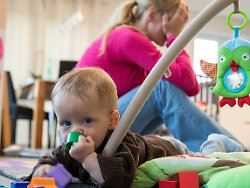Wednesday, December 15, 2021
Pandemic complicates the situation
Many single parents need Hartz IV despite having a job
According to a Bertelsmann study, 860,000 employees have to top up with Hartz IV. Single parents are particularly hard hit. One in six of them receive social benefits alongside their job. The pandemic is further exacerbating the situation as many mini-jobs are being eliminated.
You have a job and are still dependent on social benefits: According to a study, around 860,000 people have to top up. Single parents are particularly affected, as the Bertelsmann Foundation said on Wednesday. “It is frightening that such a high proportion of single parents, despite work, are dependent on transfer payments in order to secure the subsistence level for themselves and their children,” explained the director of education at the foundation, Anette Stein.
A total of 22 percent of social assistance recipients under the Social Security Code II (Hartz IV) were gainfully employed in June 2021, as Bertelsmann announced. According to a long-term study for the period from 2010 to 2018, a third of all welfare recipients living in families with children were gainfully employed. In June 2021, more than 1.8 million children were living in families that received Hartz IV. Often, however, the work is only payable to a limited extent for beneficiaries: they are only allowed to keep a small part of the additional income, they are not allowed to save up a fortune.
Working hours and hourly wages are crucial
According to the Bertelsmann Stiftung, whether or not employees had to increase their workforce was related in particular to their employment situation. “The lower the working hours and the lower the hourly wages, the higher the probability of having to draw additional SGB II benefits,” explained the foundation. Almost half of the top-ups (46 percent) therefore had marginal employment, and over three quarters also received a low wage.
According to the study, single parents had to increase their intake particularly frequently: more than every or every sixth employed single parent received additional benefits under SGB II. “Single parents are highly motivated to be gainfully employed,” Stein continued. “But it is particularly difficult for them to combine work and family”. However, whoever is solely responsible for caring for a child often has no choice, explained the foundation.
The corona pandemic has exacerbated the situation: Although the proportion of toppers has decreased, in 2019 it was still over 26 percent. However, this was not due to an improvement in the employment situation: the experts see the main reason rather in the loss of many mini-jobs, especially in the hospitality industry. In addition, childcare has become an even bigger problem during the pandemic.
Four central risk factors
Accordingly, Aufstocker also more often had a migration background and were more likely to live in East Germany. A low level of education also increased the risk of top-ups. Another factor was the state of health.
In order to improve the situation of single parents in particular, the experts called for a basic child benefit. The Ampel coalition agreed on such a measure in its coalition agreement. A reform of mini-jobs could also improve the situation: The experts called for mini-jobs to be converted into jobs subject to social insurance contributions.
The study was carried out on behalf of the Bertelsmann Foundation by researchers from the Institute for Employment Research (IAB) of the Federal Employment Agency. For their survey, the researchers mainly used the panel “Labor market and social security” (PASS). For this panel, around 12,000 people aged 15 and over in 8,000 households have been asked about their material and social situation every year since 2006/07.
